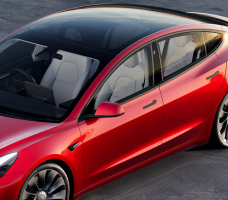
— A Tesla Model 3 glass roof crack has caused a class action lawsuit that alleges 2017-present cars are equipped with defective glass roof panels that crack or detach.
The lawsuit also alleges Model 3 cars have defective underbody panels that detach from the vehicles.
Additionally, the class action says Tesla violates Hawaii law by accessing personal information from the Model 3 cars.
According to the car owner who filed the class action lawsuit, Tesla has sold about 500,000 Model 3s and the automaker allegedly should pay "treble damages" to each car owner.
In the case of the plaintiff, he claims he paid $52,600 for his Model 3, but he argues Tesla should pay him $157,800 because of the glass roof panels and underbody panels.
Plaintiff Jerry M. Hiatt purchased a new Tesla Model 3 in February 2019 but claims he wouldn't have purchased the car if the automaker would have warned him about the alleged problems with glass roof cracks and detached underbody panels. The plaintiff also alleges no Tesla Model 3 owner would have purchased their cars either.
The plaintiff says the glass roof crack and underbody panel problems occurred within 10 months of purchasing the Model 3.
Hiatt says a large glass roof crack suddenly appeared directly over the driver's seat, and an authorized Tesla service technician examined the Model 3 and allegedly confirmed the roof glass cracked.
The tech allegedly said the glass had been installed “out of alignment” at the factory, and the technician allegedly said he had seen similar Tesla Model 3 glass roof cracks.
The class action alleges the plaintiff's Model 3 underbody panel experienced a sudden partial detachment while driving. The plaintiff says the forward edge of the panel suddenly "dug into the pavement creating a loud noise and a frightening and unexpected failure that could have easily caused a serious and/or fatal accident."
The Tesla technician also examined the rear of the Model 3 and the panel in November 2019 when the panel was hanging down and detached.
The tech allegedly said three panel bolts were missing from the factory installation and he had allegedly seen other Hawaii Tesla Model 3 cars with the same problem.
According to the class action lawsuit, the Tesla technician allegedly said there was a risk of a detached rear bumper. The tech also allegedly admitted the glass roof crack and detached underbody panel occurred due to quality problems caused by trying to deliver the Model 3 cars and meet production goals.
The plaintiff alleges he spent weeks dealing with Tesla about the Model 3 and wasn't allowed the drive the car for 69 days. Even after the Model 3 was repaired, the plaintiff alleges he noticed noise while driving.
The class action lawsuit alleges the plaintiff discovered, "there was a separation of the roof glass and a major air leak along the glass roof panels above and behind the front seat on both sides..."
As for Hawaii Model 3 owners, the class action alleges Tesla violates state law by collecting unique personal information from every car. Tesla allegedly accesses the computer on a Model 3 without authorization of the owner and uses the information for financial gain, allegedly committing a felony under HRS $708-895.5.
“A person commits the offense of unauthorized computer access in the first degree if the person knowingly accesses a computer, computer system, or computer network without authorization and thereby obtains information, and...[t]he offense was committed for the purpose of commercial or private financial gain.” — HRS $708-895.5
The Tesla Model 3 glass roof crack class action lawsuit was filed in the U.S. District Court for the District of Hawaii: Jerry M. Hiatt v. Tesla Inc.
The plaintiff is represented by the Bickerton Law Group.




